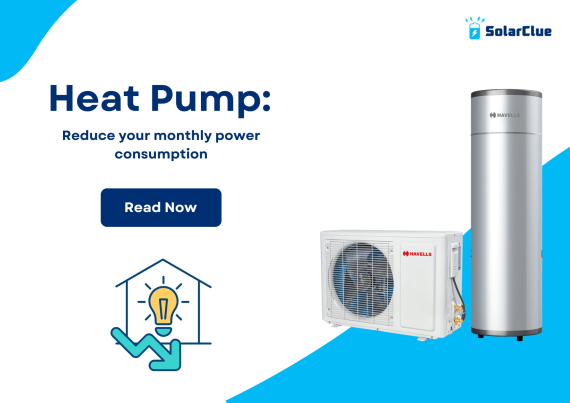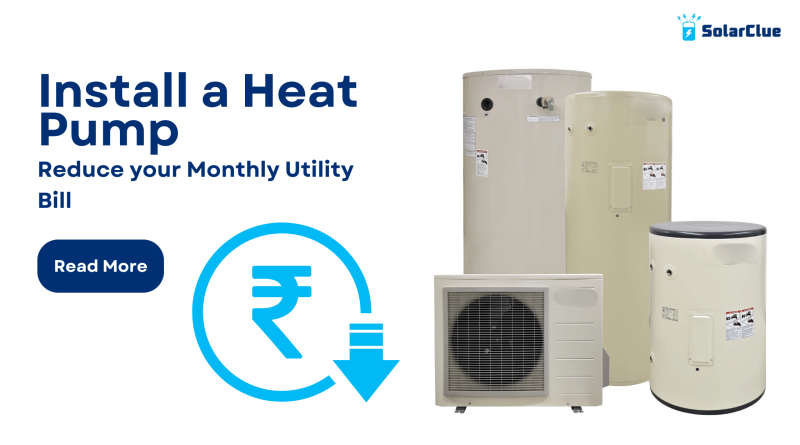Install a Heat Pump to Reduce your Monthly Utility Bill
Are you tired of high utility bill every month? Do you wonder why your house electricity bill is so high? Many Indian households struggle with this issue, often due to inefficient appliances. One major contribution to your high electricity bill is the water neater that is used in your home. So how to reduce the meter bill? You must adopt an energy-efficient water heater. So which type of water heater is energy-efficient? One such water heating appliance is a heat pump.
Let’s explore how switching to a heat pump can help to reduce your monthly utility bill.
Table of Contents
What is a heat pump?
A heat pump is a water heating device, to meet your daily hot water needs. It is energy-efficient, as it uses less electricity than other traditional water heaters. The difference lies in the working principle. Any traditional water heater, like a geyser, uses direct electricity to heat water. Whereas, a heat pump uses electricity to only transfer heat from one place to another. This heat is used to produce hot water, rather than electricity.
How does a heat pump system works?
A heat pump works on the principle of transferring heat from one place to another.
This system consists of two main components: an indoor unit and an outdoor unit.
The outdoor unit has two parts – an exhaust fan and a compressor. The indoor unit is the storage tank, where water is stored.
The exhaust fan absorbs heat from the surrounding air, while the compressor compresses the refrigerant gas, increasing its temperature. This heated refrigerant gas then passes through a spiral condenser inside the indoor unit, transferring its heat to the water stored in the tank. This process continues until the desired water temperature is reached.
Unlike traditional geysers that use a significant amount of electricity to generate heat, heat pumps consume less energy by simply moving heat from one place to another. This makes them more energy-efficient and cost-effective in the long run.

Do you ever wonder which water heater has the lowest power consumption? As discussed earlier, heat pumps consume significantly less electricity to operate efficiently. So this system definitely has a low power consumption. This will result in reduction in the monthly utility bills.
Heat pumps are said to be 90% renewable. It consumes up to 75% less electricity than other electric water heaters like a geyser. So , it is a great alternative to meet your daily hot water needs. It is cost-effective and energy-efficient.
What are the benefits of heat pump water heaters?
Apart from reducing your monthly utility bill, heat pump systems offer several benefits. This makes it a great investment option for all Indian households. Let’s take a look at the advantages that it offers:
1. Cost-Effective
Heat pumps have high upfront cost. However, they make up for it through lower operating costs. Heat pumps transfer heat rather than generating it directly. This uses far less electricity – up to 75% less. Over its 10-15 year lifespan, a heat pump can save you hundreds or even thousands in energy costs. So it is actually a cheaper alternative to other traditional water heaters like geysers.
2. Long Lifespan
With proper maintenance, heat pumps last 15 years or more – significantly longer than standard electric geysers (8-10 years). So there is no need for replacement for a long time. This extended life cycle also contributes to it being a cost-effective option.
3. Reduced Water Wastage
Traditional water heaters constantly heat and reheat the same water, leading to significant energy losses. Heat pumps are automatic system as it heats water more efficiently. So when you run the hot water tap, the hot water flows instantly, and you don’t have to wait for it to flow. This results in a decrease in wastage of water. This conserves water, especially in households with long pipe runs.
4. Positive Environmental Impact
By consuming significantly less electricity than conventional water heaters, heat pump water heaters have a lower carbon footprint and contribute to reducing greenhouse gas emissions. This positive environmental impact is achieved by relying on renewable energy sources (ambient air) and minimizing the use of fossil fuels for power generation. Additionally, the longer lifespan of these systems further reduces the environmental impact associated with manufacturing and disposing of water heaters.
5. Efficient in Cold Climates
One common misconception about heat pump water heaters is that they may not perform well in colder climates. However, modern heat pump water heaters are designed to be efficient even in low temperatures. They can effectively extract heat from the surrounding air, even when the temperature drops below freezing. This makes heat pump water heaters a viable and energy-efficient option for hot water needs in various climates, including colder regions.
6. Manual Temperature Setting
Most heat pumps allow you to change temperature as per your requirements. This ensures you have hot water when needed without wasting energy by overheating the water beyond your requirements.
7. Availability in Different Sizes
Heat Pumps normally have an indoor and an outdoor unit. But many homes in India, specially in big cities, may not have that space available. For that, a single-unit heat hump is designed. It is also called Integrated Heat Pump.
Conclusion
If you’re searching for ways to reduce your utility bill, a heat pump is an excellent solution. It will not only save cost in the long run, but also contributes towards a sustainable future. By installing a heat pump, you’re making a responsible choice, making it a great investment option. Take control of your electricity costs today with this smart, efficient technology.
Visit SolarClue® to see the best heat pump water heaters. SolarClue® is an online marketplace where solar energy products are sold at discounts up to 50%.




